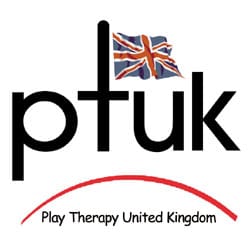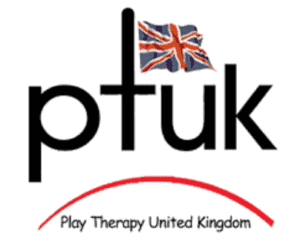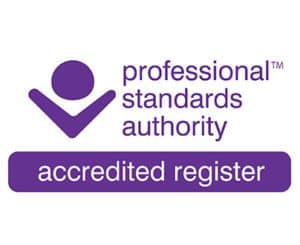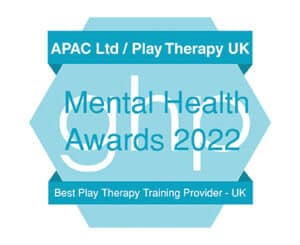Continuous Professional Development (CPD)
Upcoming CPD Courses
If you would like further details about this programme please call us on 01825 761143 or email us at contact@apac.org.uk
Three Levels of CPD Events
| A Post Qualifying (PQ) training course | These courses are:
the major way of acquiring new skills that complement initial training in play therapy kite marked by a university to assure academic quality subject to the PTUK/PTI four level model of quality assurance Current subjects are: clinical supervision, filial play coaching and sand play therapy skills. Because they are of at least 4 days in length and require practice hours they exempt participants from any further CPD in the year in which the course started. e.g. a course started 17/06/2023 exempts for the membership renewal on 1/2/2024. |
| An accredited event | These events:
are provided by a PTI/PTUK member have been accredited to PTUK/PTI CPD standards of quality assurance have CPD certificates issued by PTUK/PTI meet the requirements of categories 1, 2 and 3 |
| An approved event | These events:
are provided by a presenter who has a UK or international reputation, as judged by PTUK/PTI, in a field that is relevant to play therapy or its derivatives have attendance certificates issued by the provider meet the requirements of categories 1 and 2 (At present an approved event has equivalence to an accredited one for CPD purposes) |
The CPD Categories
Continuous Professional Development (CPD) – is essential for good quality practice by certified and accredited PTUK/PTI Practitioner Members, to maintain an entry on the Voluntary Register. The requirement is to undertake at least 30 hours of allowable activities each year to retain membership. Planning for CPD and play therapy training should be based upon PTUK/PTI’s competency framework and an individual assessment of needs based on a clinical audit. In some countries these standards are known as Continuous Education (CE).
The activities must be selected from 3 or more categories, at least one of which must be from categories 1-3. The maximum hours allowed per year is the number that may counted towards the 30 – you may of course undertake more if this category is useful for you, but the excess may not be counted for CPD. [N.B. The list of examples is not exhaustive].
The main principal of CPD is that you can attend, without having to seek permission form PTUK/PTI, any CPD event run by well known professionals in the play therapy or psychological field and at an established venue, as long as you are able to evidence, in Fortuna at revalidation time, how this workshop has contributed to the development of your play therapy practice, not your counselling or educational practice. This applies for sections 1, 2 & 3.
If you have any doubts about the validity of your proposed CPD activity please check with PTI or PTUK before you are committed to it, to avoid wasting time and money.
|
Category |
Conditions and Examples |
Max Hours Allowed per year |
| 1 | Short Courses on Professional Issues
(a) Courses undertaken in areas of special interest or concern which are relevant to play therapy practice e.g., sand play, storytelling, working with abuse, working with trauma, bereavement. These may be courses that are accredited by and registered with PTI/PTUK and at stage 4 of the PTUK Training Model. The course content must include competencies listed in the Profession Structure Model competency framework. (b) Other approved courses are those delivered by presenters who have an international or national reputation in a related field for example Dr Alan Schore, Dr Dan Siegel, Dr Sue Gerhardt. Please provide the full title of the course, the CPD hours being claimed as you may be asked to evidence your attendance. |
20 |
| 2 |
Seminars and Conferences PTUK, PTI and other affiliated organisations as detailed above. Seminars / conferences on topics relevant to play therapy practice, which may be organised locally, nationally, or internationally, by individuals or organisations. For example: PTUK/PTI Conference. Please provide the full title of the course, the CPD hours being claimed, with a copy of your attendance certificate with your membership renewal documentation. PTI Online conference attendance 5 – CPD points PTUK Annual conference attendance – 8 CPD points
|
20 |
| 3 | Study for Further Qualifications
Further award bearing training in a relevant professional field e.g. PQ Certificate in Play Therapy and Creative Arts Supervision, or MA in Practiced Based Play Therapy. These will normally be Post Qualifying courses ‘kite marked’ by a university. The course content must include competencies listed in the Profession Structure Model competency framework. Attending an approved PQ course will exempt you from any other CPD activity during that year. Please provide the full title of the course, the name of the training provider, the date, and the venue in your membership renewal documentation. |
20 |
| 4 |
Assisting the Development of Others Designing and facilitating workshops; offering a training session or giving a talk at a conference; writing e.g., articles, book reviews, books (relevant to professional practice); published research; initiatives taken alone and in consultation with peers to create and develop new ideas relevant to therapeutic play, play therapy or creative arts therapies and making these available to others. Please provide the full title of the workshops or papers etc, the CPD hours being claimed, the date and the venue/publication in your membership renewal documentation. |
20 |
| 5 | Working Party / Advisory Board and other Meetings
Play therapy related meeting work, local or national consultation with colleagues leading to initiatives such as establishing local groups. Membership of committees where play therapy may be represented to others. Contribution to PTUK standards. Representing PTUK as a stakeholder at NICE consultations, meetings with local commissioning groups to promote play therapy Please provide a list of these events, the CPD hours being claimed, the date and the venue in your membership renewal documentation. |
10 |
| 6 |
Personal Development Participation in groups; learning new skills; Acquiring knowledge and new insights from reading, films, plays. (Personal therapy is not to be included) Please provide a list of these activities, the CPD hours being claimed, the date and the venue in your membership renewal documentation. |
10 |
Please note: The CPD categories tell you under which category you can claim your points. You would normally get 1 CPD point for every face-to-face hour of training in categories 1 & 2 with online courses being claimed in categories 5 & 6.
The other categories are self-explanatory.
If you have any queries, please email contact@ptukorg.com
The Need for CPD
One of the main objectives of PTUK is to ensure the protection of the public and the children in particular, from unsafe and ineffective practice. One of the ways of achieving this is through CPD. A main principle of PTUK is to encourage and support Life Long learning.
PTUK Constitution Standing Orders para12.6 requires that Registrants will have attained a standard of training, competence and experience in the therapies as defined by the Board of Directors. They are required to maintain their ability to perform competently by undertaking further continuous professional development (CPD) activities.
The PTUK Ethical Framework, requires under the Beneficence principle that practitioners “…. commit to updating practice by continuing professional development.”
Continuous Professional Development is regarded as essential for good quality practice by certified and accredited PTUK Practitioner Members. The requirement is to undertake at least 30 hours of allowable activities each year to retain membership. Planning for CPD and play therapy training should be based upon PTUK’s competency framework.
Gaining a professional qualification is not the final aim but rather just one stage in the process of lifelong learning. PTUK Members need to consolidate, change and develop in order to remain competent to practice, perhaps in a number of roles, in an evolving profession. Qualifications awarded for life, can soon become outdated, witness the impact of advances in neurobiology on therapeutic play.
CPD must be more than just passive learning activities or attendance at events – just to fulfill the membership requirement. It should occur in various contexts and through a wide-range of activities; it can be achieved through creating knowledge and disseminating it as well as receiving it and does not have to be done through structured or formal training.
Registrants need to be able to take full responsibility for the effectiveness and development of their own practice. PTUK’s CPD policies need to be comprehensive and flexible to reflect the diversity of practice and environments in which they work.
CPD needs to be based on active analysis and reflection upon practice in a way that allows the individual to specify what needs to be done to effect improvements. An individual’s CPD plan should be informed by their own clinical audit. CPD is about moving from passive experience to active attempts to learn and go forward from that experience.
CPD must be something that is capable of being accounted for and in some way verified, in order to demonstrate that it has taken place with some impact on future practice. Registrants need to be able to describe what happened and specify at least some of what has been learned in a way that another informed individual can understand. For CPD to be effective a balance of work based, self directed study and community activities are needed.
CPD must occur within a learning cycle where the individual is in charge of their learning and can set development objectives relevant to their own needs, based on their current situation and identified goals, through a think, plan, do, review process. Only when this has been done can they identify the training courses or other activities that they need.
Recent Changes to CPD Policy
CPD – has always been essential for good quality practice by certified and accredited PTUK Practitioner Members in order to maintain membership. With the growth in the number of grades and titles within PTUK and the imminent approach of Right Touch regulation by the Professional Standards Authority (PSA) The Executive Board of PTUK has reviewed our CPD standards and implemented two changes.
These are:
- The development of more specific procedures for practitioners who have left the profession and wish to re-join the PTUK Register.
- Improved quality control procedures for training events that are eligible for CPD hours.
CPD for Different Situations
PTUK’s CPD standards cover 3 situations:
- The continual updating of practicing Registrants skills and experience – the standard requirement – see section 2.4 below
- Elective lapse of registration. The activities required for re-registration as a practitioner after a period of not practising (sometimes termed a sabbatical) and defined as more than three months of not working with a client and where CPD activities have been discontinued
- The CPD activities required for re-registration as a practitioner after a period of suspension or termination of membership of PTUK/PTI, or non-renewal of membership
There are some circumstances where a Member who does not practice is granted exemption from having to undertake CPD activities. These include the following exemptions:
- For 12 months for parents after adoption, birth or long- term fostering of a child
- For 6 months for bereavement of a partner, child or other family member living in the household
- For a temporary situation (of up to 12 months) for being a full time carer of a partner, child or other family member due to illness or injury
- For a temporary situation (of up to 12 months) for the practitioner needing to take time off due to illness or injury
Where a practitioner has chosen to take a break from practice for reasons other than these, the Executive Board of Directors will decide upon the type and amount of CPD that is required.
The type and amount of post qualification experience will be taken into account in assessing the amount of CPD required to return as a practising member of PTUK.
If a Member has been suspended from the Register the type and amount of CPD required will be determined by the sanctions imposed as a result of PTUK’s Complaints & Concerns Procedure.
A Member refused renewal of membership and removed from the Register may not reapply for a period of 5 years from the date of removal. A specific programme of re-training, to be undertaken, will be specified by the PTUK/PTI Executive Board.
CPD Standards
Training events registered as accredited or approved by PTUK or PTI will be eligible for the CPD hours that may be claimed in categories 1, 2 and 3.
This will also provide Members with the assurance that PTUK/PTI has assessed the courses as being relevant to therapeutic interventions with infants, children and young persons and that they are good value.
Some external advertised CPD training, may not be of sufficient quality to meet PTUK/PTI standards or, in our view, offer a good return on money and time.
Annual CPD Standard Requirement
The criteria that have been used to set the annual CPD requirement are:
A reasonable amount of time that will bring about an improvement in practice but not impinge too severely on practitioner’s professional and personal lives. A broad range of learning and career activities that will help to develop the holistic practitioner, not merely a permanent trainee.
The PTUK/PTI requirement is to undertake at least 30 hours of allowable activities each year to retain membership and or AR registration. Planning for CPD and therapeutic training should take into account PTUK’s competency framework to determine the relevance of the activities (What might be done) and an individual assessment of needs based on a clinical audit, carried out by themselves (What should be done).
The activities must be selected from 3 or more categories, (to provide breadth of learning experience) at least one of which must be from categories 1-3 (to ensure rigour). The maximum hours allowed per year is the number that may counted towards the 30 (to ensure a balance) – you may of course undertake more in any category, if it is valuable for you, and we encourage this but the excess may not be counted for CPD. [N.B. The list of examples is not exhaustive].
If you have any doubts about the validity of your proposed CPD activity please check with PTI or PTUK before you are committed to it to avoid wasting time and money.





